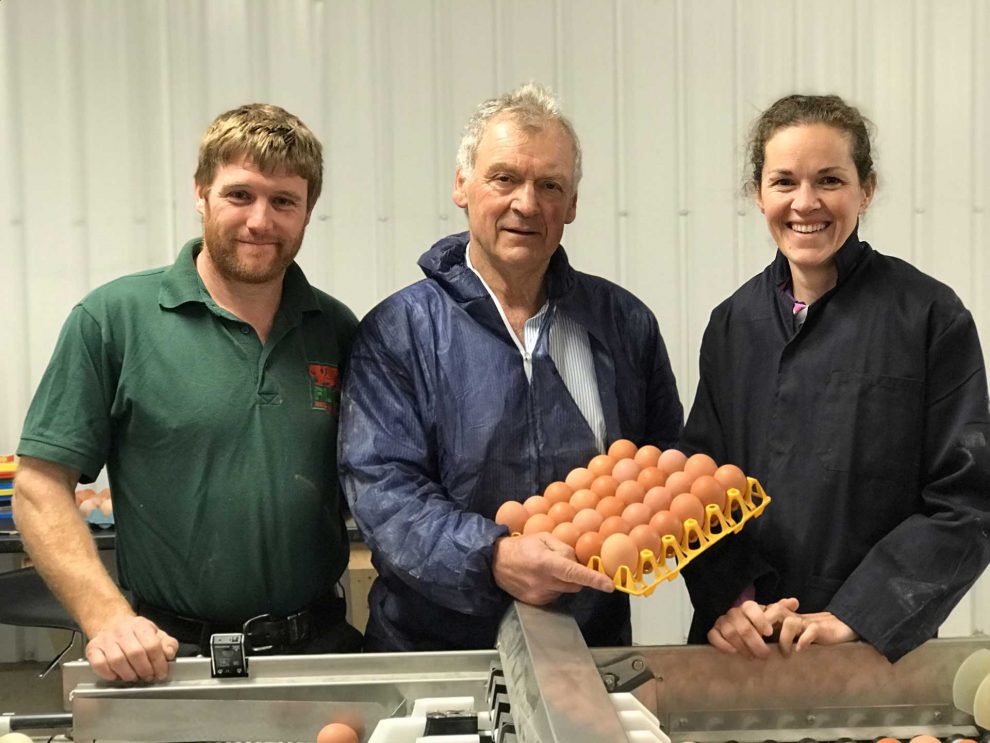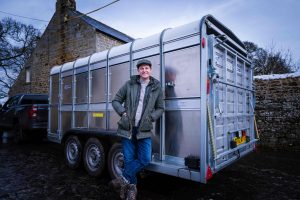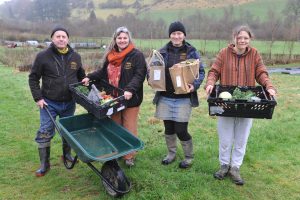THE UNCERTAINTY created by Brexit and a desire to see the family farm succeed for years to come led one Welshpool farming family to make a feathery change.
Farmers’ Union of Wales members Mark and Helen Williams, who farm 40 suckler cows and 900 ewes at Pen Y Derw, near Welshpool, decided to diversify into egg production and have been up-and-running since June this year.
The poultry unit, which is home to 16,000 free range hens, provides the family with an additional income, as well as offering extra part time employment in the area.
“We have looked at poultry farming for the last ten years and the uncertainty created by Brexit, bearing in mind that most of our income has been provided by lamb trade and farm support payments, gave us the push we needed to make the decision and get the ball rolling,” said Mark Williams.
The planning process started in early 2015 and after lots of drawings, surveys and modelling, planning was granted in November 2015.
“Egg production is mainly a domestic market, so that takes the fear of having to export away. Originally we thought we would be going into broiler chickens but when researching the market a contract was difficult to find. The final thing that made us decide were our 3 boys. We are expanding the business to accommodate them if they wish to take over the farm in the future,” added Mark.
The eggs produced at Pen Y Derw are sold to L J Fairburns & Son, who collect them to be processed (graded) and packed, and they are then sent to distribution centres and onto supermarket shelves.
The chickens produce between 14,500 – 15,500 eggs every day, and Helen is in the chicken shed by 6.30am to check the birds, before heading back to house by 7.30 to make the boys their breakfast and do the school run.
Then its back to the chicken shed to start packing eggs by 9am, which takes about three hours.
By around 5pm Helen makes her way back to shed to do the final walk around and check the hens are ok.
Talking about her new routine she said: “I have to fit things in around the boys where possible and the mornings are now taken up with the hens.
“Before I had time to do other jobs, such as housework, banking, paperwork etc. so the pace here has definitely changed. Looking after the chickens is not so heavy and physical as looking after the sheep and cattle and it’s work in a dry and warmish environment.”
Walking around the chicken shed, Mark explains the production process: “The hens lay their eggs in nest boxes. Then the eggs roll onto the egg belts, which take them onto a cross conveyor and into the packing room.
“Here they are graded by hand, go through the machine to be stamped and put in trays. Then they go along a belt into a tray stacker, which stacks trays in sixes. Once we have a run of six stacks we put them on a pallet, which is a total of 720 dozen eggs. This is then wrapped and labeled and left in the cool room for collection,” he said.
Even though the couple have now got used to their new routine, it has not all been plain sailing from the start. Helen explains: “The birds arrived in a really hot week in June and they weren’t eating or drinking enough to start, although they were still gaining weight.
“That was a bit of a worry for us but thanks to the support from Lloyds animal feed we managed to get everything sorted. We also had a few very minor teething problems with the equipment but now everything is running well. With all the eggs our hens are producing we look forward to lots of cake here at home and a reduced fertiliser bill.”
But do the couple think they have made the right decision 4 months into their new way of life?
“We are still learning and it has changed our life quite a bit, maybe ask us again in 12 months time,” laughs Helen.
Having visited the farm and seen the new chicken shed in action recently, FUW County Executive Officer Emyr Davies said: “Mark and Helen are a credit to our industry. Their enthusiasm and dedication to give their farming business a chance of survival in light of the uncertainty created by Brexit is really an inspiration.
“Of course, this sort of diversification doesn’t suit everyone and there are often stumbling blocks with regards to planning that hold many farm businesses back. I would urge those in charge of granting planning permission to think again and not be the block that holds those farms back who want to future proof their business.”


















Add Comment